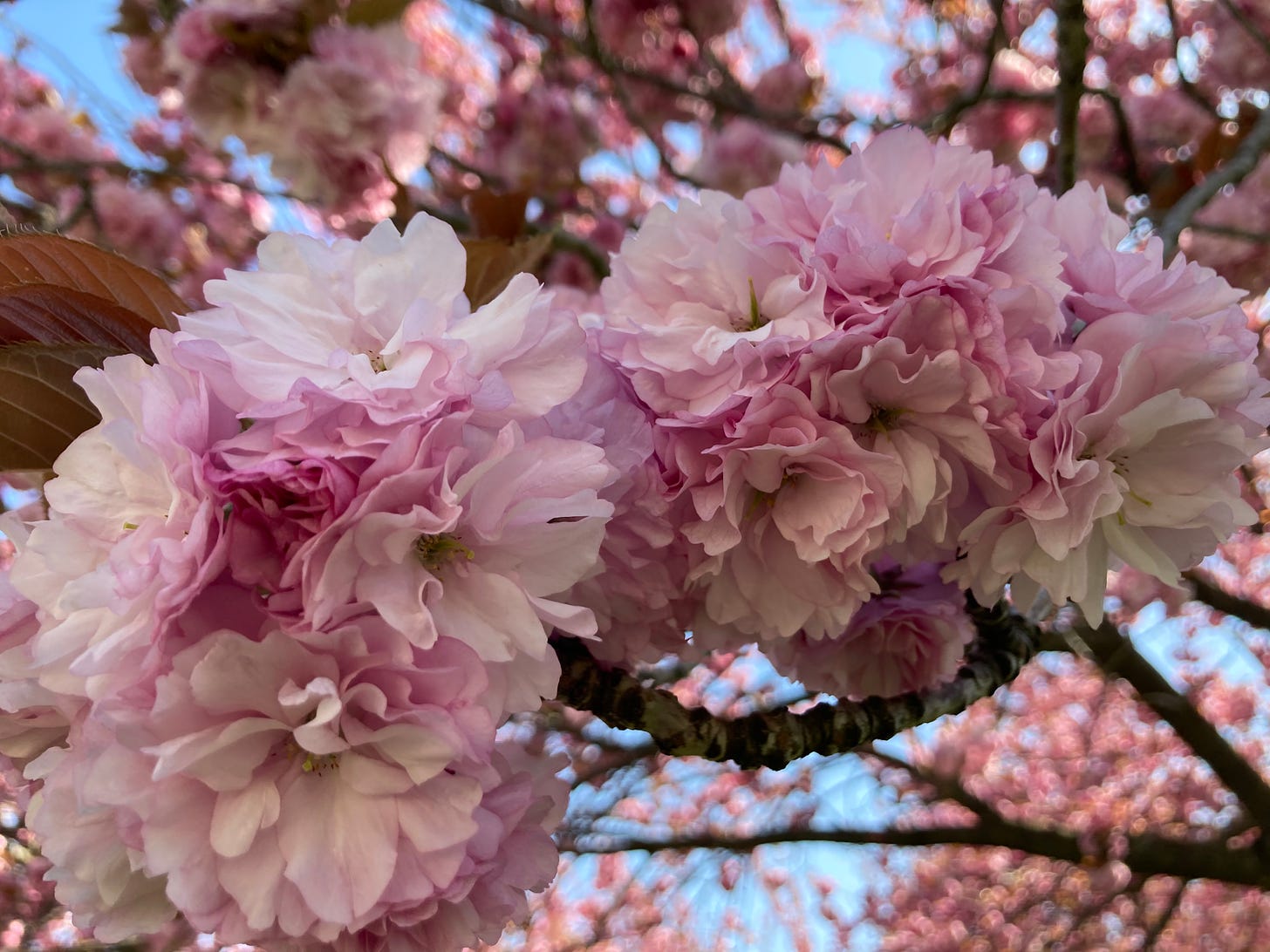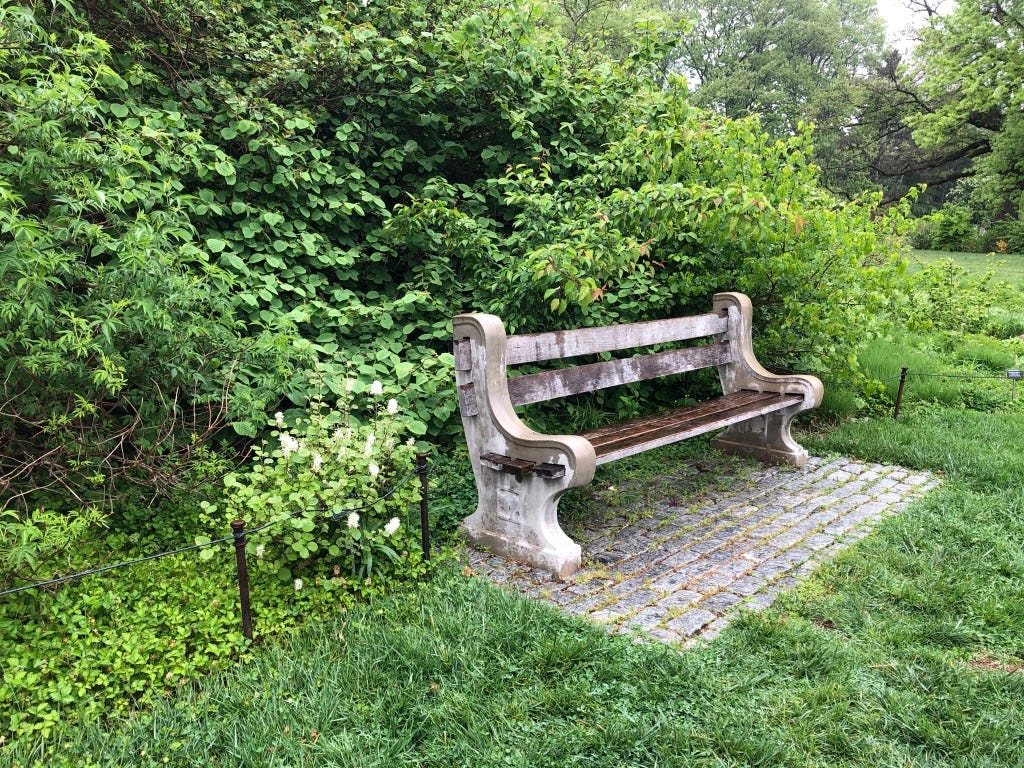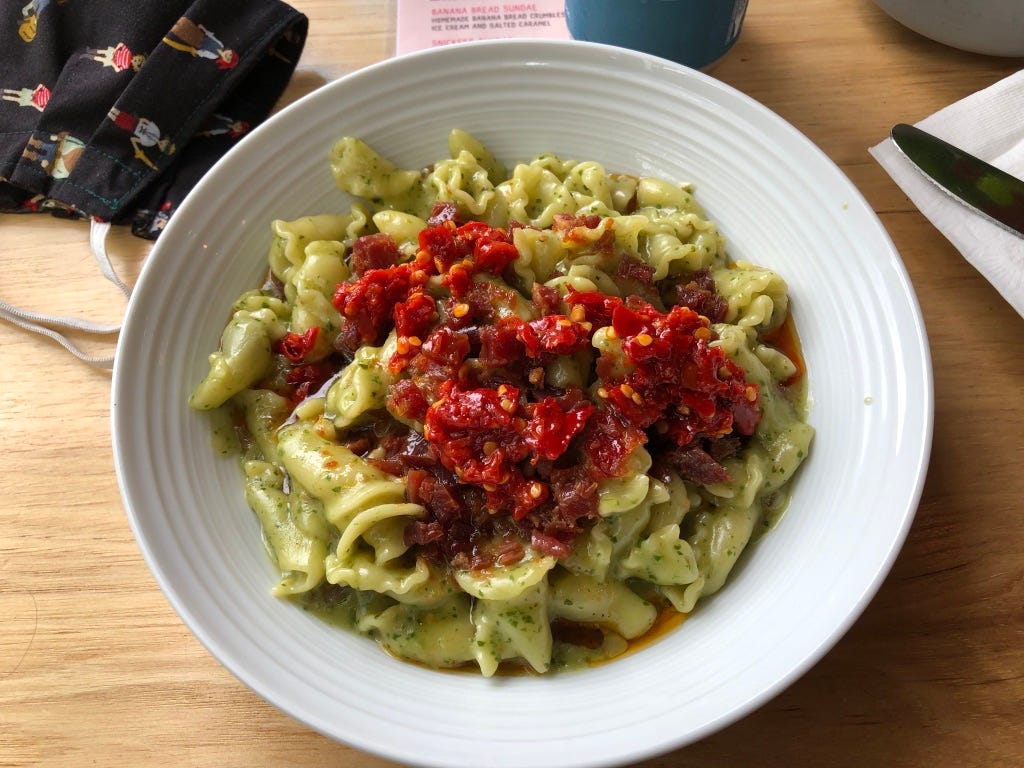“This all feels surprisingly natural, like riding a bike. Except, you know, that every once in awhile I get the urge to just curl up into your chest and cry.”
Susan Choi and I are talking at a party about what it feels like to be talking at a party. It’s at this party that I ask her if she’d be interested in going for a walk and she agrees. “Wait,” she says, “you’ve never been to the Brooklyn Botanic Garden?”
I haven’t. So we set a time and when the day comes, I meet Susan at the front gate. It’s raining as we start our walk at the Japanese Hill-and-Pond Garden, and then wander over to the Cherry Esplanade, followed by the Osborne Garden and the Lilac Collection and the Bluebell Wood and all the other colorfully named places that make me feel like I’m a character in a very soggy copy of Alice's Adventures in Wonderland.
Susan has, unsurprisingly, brought an umbrella. She offers to share it as we walk, but I demur. The rain is warm and soft, and makes the flowers even brighter, somehow even more beautiful. Maybe the rain will do the same for me.
Isaac: What’s your relationship with the Brooklyn Botanic Garden?
Susan Choi: The way it works is, in the spring when all the flowers are blooming I remember that this place exists. I say to myself, “I’ve got to go and see everything blooming.” Then the summer arrives, and I’m usually away teaching during the summer. When I return in the fall, I forget this place exists. Then in the winter I don’t remember that it exists. And then spring comes again, and I remember. So I only come here in the spring. Which is a shame, because it’s a year-round place.
I: How long would you say you’ve been coming here?
SC: Since my kids were really little. Because I have pictures of my kids at every cherry blossom season that I was able to drag them to. I even have some really negative Sakura memories of, say, having a near fender bender in the parking madness and swearing to never attend Sakura again.
But I love flowers and gardens. And it was only recently that I learned that my love of gardens does not extend to creating them myself. I’m always saying, “Oh, I love this, I’m going to plant these flowers at my house,” and then I let them die. I’m now more in touch with my specific relationship to gardens, which is that someone else should make them.
I: And you will appreciate them.
SC: And I will appreciate them!
I: You’re an audience of gardens.
SC: I am an audience of gardens. I am not a maker of gardens.
Ok, here are all the cherry trees. In those two rows, and this one we are standing under, which is more blossomy. The other day I was noticing that the trees on the Esplanade are all at different places in their blooming, even though they’re all together and they’re all the same type of tree. And now this one is blooming later than all of those trees. But those trees — which are now mostly green leaves and much less blossoms — when I was here two weeks ago, they were at their peak in terms of blossom to leaf ratio. All blossom, almost no leaf.
I: Pure, uncut blossom.
SC: Bright, pink pom-poms. It’s almost ridiculous looking, but really pretty.
I put pressure on myself, saying, “I’ve got to get there when it’s peak cherry blossom,” and then I feel bad if I miss it. So this year I was really proud because I was like, “I got here.” But I’m also trying to be a little more philosophical about how the whole tree is beautiful. What we are witnessing here is beautiful. We don’t need to think, “Oh no, we should have been here fourteen days ago”. This is also gorgeous.
Ada Limón has this exquisite poem, “Instructions on Not Giving Up.” It’s about the spring blooming, and the message of her poem is, all that tacky fireworks is kind of wild, but I like it after the confetti is on the ground and the leaves come out. So her poem is like, “yeah yeah yeah, pom poms, confetti, crowd pleaser — but when that leaf emerges, that’s my moment. That’s awesome.” And I think that’s wonderful.
[Editors note: I reached out to Ada Limón and asked permission to share her poem in full, which she happily agreed to.]
I: You won the National Book Award in 2019 for Trust Exercise and then, a few months later, the world stopped. Do you have any feelings about that? Do you think about that?
SC: I don’t actually think about it that much. It’s funny, because I recently saw my fabulous speaking agent. And I never had one of those before the National Book Award. I had never been in this world of, “Oh yeah, we’ll pay you to just show up and talk.” So I did not know this was a thing. I mean, I knew it was a thing, but I simply did not know anything about how it worked.
I: Or how lucrative it can be.
SC: Or how lucrative it *can* be *if* there’s not a global pandemic. So I signed right after the National Book Award and right before the pandemic and then my speaking agent got to work and booked an incredible number of engagements for me that all got… cancelled. Or deferred. Or in the best case scenario, got transformed into a virtual event.
But not knowing the world of the “successful writer who is paid to simply show up some place” before that, I didn’t miss it. Then I saw my speaking agent the other day for the first time in person — we had never actually met — and he brought up this very question. He said, “It’s such a shame that we had this springboard, and this year of amazing stuff that would have been a further springboard upon springboard, that all simply got wiped out.” And I hadn’t actually thought about it until he said that. And I was like, “Oh, yeah. Yeah. That’s a loss.” But it’s a loss that until it was pointed out to me, I hadn’t really felt.
Not to sound too Pollyanna about it, but what I actually felt was amazed that I got an in-person ceremony and party before the world shut down. A sense of, “Wow, I can’t believe we actually got to have this super glamorous drunken evening that ended with me winning this thing that is literally so heavy that I carry it around for half an hour while people were congratulating me because I couldn’t figure out where to put it down.” And when I finally did put it down somewhere my arm hurt for days afterwards. The award weighs twelve pounds. Which is a lot to carry in one arm if you’re not trained up by, say, carrying a baby around every day, which I haven’t done in a long time. So I had been seeing the glass as half full. Thinking, “I can’t believe I actually got to have that incredible night before this long, year-plus of no group anything.” So I’m grateful that my last significant memory before the pandemic is this wild, drunken, fun party where I got this big prize. It was awesome.
I: You’re basically saying, “I’ll take it.”
SC: The fact that I didn’t get to do a bunch of things that I don’t know what it would have been like to have done them, it doesn’t register that deeply. So that’s where I’m at with it. I am saying, “Oh, I guess if there hadn’t been a global pandemic that put everyone in a deeply bad, bad, bad, situation, I would have had… more?” But my situation is good.
I’m going to go smell that lilac.
I: OK, let’s go smell that lilac.
SC: I am such a sucker for an English garden. There’s something very precious, very white people, about it. Lots of land, make it look kind of like nature, but nicer than nature. But I love it.
I: It’s a fake wildness.
SC: A fake wildness that is so pretty. And I enjoy the scale too. Things are small, and scattered around, and it’s informal, and — oh look — there are some super tiny daffodils! Look how small they are! I think this is the best.
I: And do you know what these flowers are?
SC: The yellow ones are called Heart-leaved Groundsel. They blossom early and stay out for a while, so the pollinators love them. The bees are saying, “I’m looking for a flower and there’s not many to be seen — oh look! The Heart-leaved Groundsel has bloomed.” So it blooms early and it sticks around for at least a few weeks, looking great.
I: Not like those flashy peonies or azaleas.
SC: Right! Those flowers are like, “You are going to wait all year for me. I’m really beautiful right now! Did you miss it? Sorry. Come back next year.”
I: Something I’m thinking about as we walk through these tiny, wild gardens. During the pandemic, all our worlds became smaller. Which made me really take stock, in a way, take the time to notice things a bit more. Was there anything in your life that the pandemic helped you pay closer attention to? That you started to love more?
SC: I would say reading, weirdly. I’ve always read, right? We’re writers. We’re supposed to read. I teach, so I have to read all the time. Constantly reading, reading, reading. But I think my relationship to reading really changed last spring. It became so calming. Almost a meditation. Thinking about what I’d read next, what I was feeling about what I was reading, where I was in any given book. The experience of reading reemerged for me. It was almost like a landscape. I kept asking myself, “Why do I want to read this right now? How is this affecting me?” You know? “What am I thinking about when I’m not actively reading this but I’m still thinking about it?” It was interesting, that whole internal landscape that I think I was simply walking over in the past when I read something, where I would just read it, suddenly became really visible.
I: Oh, wow.
SC: It was amazing. And I kind of miss it. Because I think I was also — it was when things felt so locked down that there really was a kind of stoppage. People weren’t emailing you all the time. There was sort of this quietude where everyone was waiting. But I was reading for much more prolonged periods then. I would sit out on my deck and read for two or three hours in a stretch, which I don’t think I had done since I was a college student. And it was amazing. And it took me places in a way that reading hadn’t done in awhile, even though I’m a lifelong reader who has to do it professionally. So that was very lovely.
I: That’s beautiful. And now you’re going to try and keep doing that here?
SC: Yes, I’m going to find some of these benches and try to do that here.
I: Have you been able to write? Or, more importantly, when you’re writing, how do you find your way into the story?
SC: I’m not conscious at all of choosing subject matter. In fact, on the occasions that I’ve tried to write about something that’s important to me — where I state, “I’m gonna write about this” — it never goes well. Because it’s always kind of a mystery to me what I’m going to end up writing about. There’s no real planning.
I: So you are one of those writers who just jumps off the cliff and sees what happens?
SC: I mean, it’s even like, “what cliff?”
But seriously, I can tell you the story of how I found my way into each of my books, but it’s always different, and no method has ever emerged for me to find my way into the next book. With each one I was lost and wandering in the unmarked desert of what I’m going to write about, and then at some point I was writing about this, and I can tell you landmarks along the way, but I could never reconstruct the process. And then when I finish that book, it’s not like I know how to find my next project. I never know. And right now I don’t know what my next project is, still. I’m still searching.
I: It feels a little bit like those English gardens that you like. You don’t like the strict planned out garden. You like the meandering, “I’m walking through the stuff” ones.
SC: That is very true. I do like the meandering ones, where you don’t know which way you’re going to go. I don’t like the formal gardens. Although, there are more similarities than you might think. Because the gardens that are planned to seem unplanned, which is all very manipulative, they do create all of these different vistas and views, but you discover them. It’s not obvious what they’re going to be. I really like that. And I think with formal gardens, it’s obvious. You think, “I’m supposed to stand here and look in this way,” and with those more meandering ones, there are all these turns you can take where you’re like, “Oh, this looks different than it did the last time I was here.” So I like that and I think in a way my writing process is similar, because I often know vaguely that, say, this terrain interests me but I just have no idea how to enter into it and often will write a lot of material trying to wander into it in different ways before I think, “Oh, I know the way into this.” Then, from there, sometimes, it’s a linear progression, with some of my books, and sometimes it’s not at all... but there’s always a large amount of wandering.
I: Walking around a big, messy garden.
S: Yes. And trying to find the perspective in the garden. Oh! Do you see that tulip?That tulip is a great tulip.
[Editor’s note: I forgot to take a photo of the tulip.]
After walking for hours in the Brooklyn Botanic Garden, we finally exit the grounds and Susan Choi rides off on her bike, into the rainy afternoon.
I’m soaked, and water squeezes up through my shoes as I walk past Prospect Park toward my apartment. But I’m not ready to go home yet. The high of talking with a friend, Susan’s words still bouncing around in my head—I want to keep enjoying the day. So I swing by Pasta Louise, a local restaurant that specializes in homemade pasta that went from beloved stoop sale to a proper restaurant during the pandemic.
I order a tall beer and some campanelle with pesto, Calabrian chilies, and crispy prosciutto. The cold beer and hot chilies mix in my mouth as the sky opens up and, again, it begins to pour.
















my favorite place ❤️
loving these, Isaac!
Love the inspiration to meander for a bit, in writing, daily life, and gardens. Such a relief for a task-oriented, working parent like myself.